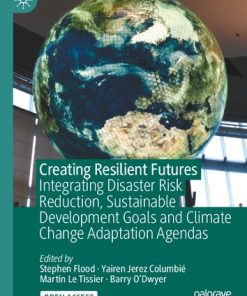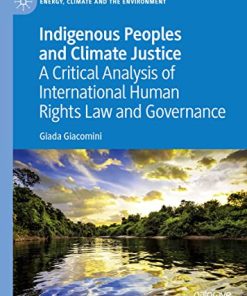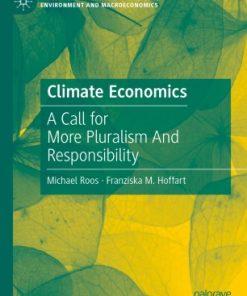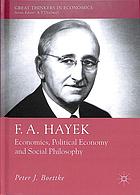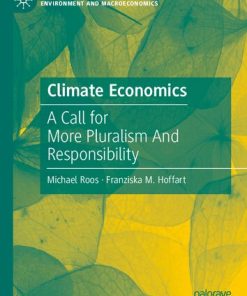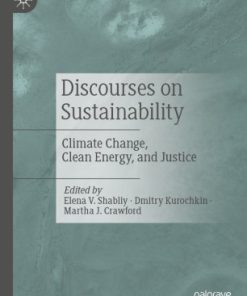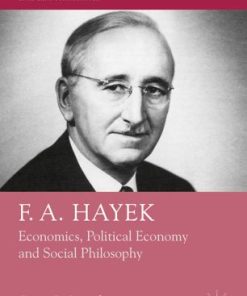(EBook PDF) Climate Justice Integrating Economics and Philosophy 1st edition by Ravi Kanbur, Henry Shue 0192542710 9780192542717 full chapters
$50.00 Original price was: $50.00.$25.00Current price is: $25.00.
Climate Justice: Integrating Economics and Philosophy 1st edition by Ravi Kanbur, Henry Shue – Ebook PDF Instant Download/DeliveryISBN: 0192542710, 9780192542717
Full dowload Climate Justice: Integrating Economics and Philosophy 1st edition after payment.
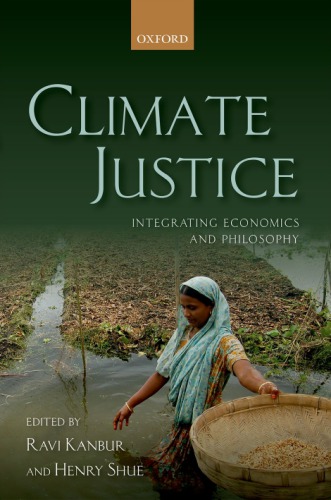
Product details:
ISBN-10 : 0192542710
ISBN-13 : 9780192542717
Author: Ravi Kanbur, Henry Shue
Climate justice requires sharing the burdens and benefits of climate change and its resolution equitably and fairly. It brings together justice between generations and justice within generations. In particular it requires that attempts to address justice between generations through various interventions designed to curb greenhouse emissions today do not end up creating injustice in our time by hurting the currently poor and vulnerable. The United Nations Sustainable Development Goals (SDGs) summit in September 2015, and the Conference of Parties (COP) to the Framework Convention on Climate Change in Paris in December 2015, brought climate change and its development impact centre stage in global discussions.
Climate Justice: Integrating Economics and Philosophy 1st Table of contents:
1. Climate Justice: Integrating Economics and Philosophy
1.1. Introduction
1.2. Overlapping Perspectives
1.3. The Volume Chapters
1.4. Pathways Toward Integration
2. Poor People on the Front Line: The Impacts of Climate Change on Poverty in 2030
2.1. Introduction
2.2. Step 1: Exploring the Uncertainty on Future Poverty and Inequality
2.3. Step 2: Selecting Two Representative Scenarios: “Prosperity” vs. “Poverty”
2.4. Step 3: Introducing the Impacts of Climate Change
2.5. Results: Impacts of Climate Change on Poverty
2.6. Limits and Conclusion
3. Governing the Commons to Promote Global Justice: Climate Change Mitigation and Rent Taxation
3.1. The Challenge of Managing Global Commons
3.2. The Climate Rent
3.3. Resource and Land Rents
3.4. Political Feasibility and Implementation
3.5. Conclusions
4. Equity Implications of the COP21 Intended Nationally Determined Contributions to Reduce Greenhouse Gas Emissions
4.1. Introduction
4.2. Pre-Trading Equity Analysis
4.3. Emissions Trading Model
4.4. Emissions Trading Analysis
4.5. Post-Trading Equity Analysis
4.6. Further Analysis
4.7. Conclusion
5. Climate Change and Inequity: How to Think about Inequities in Different Dimensions
5.1. Introduction
5.2. Different Types of Inequality and Trade-offs Between Them
5.3. Equality and Other Things that Matter
5.4. A Framework for Measuring Inequality
5.5. Conclusion
6. Climate Change and Economic Self-Interest
6.1. Introduction
6.2. The Power of Economic Self-Interest: Says Who?
6.3. Destined for Failure
6.4. Evidence on Human Motivations
6.5. Climate Justice: What Really Motivates?
6.6. Conclusion
7. Noncompliers’ Duties
7.1. The Status Problem
7.2. Four Ways to Think of Duties Noncompliers Have
7.3. Conclusion
8. Divest–Invest: A Moral Case for Fossil Fuel Divestment
8.1. The Moral Complexity of Divestment
8.2. The Unnecessary, Grave, and Substantial Harms of Fossil Fuels
8.3. Contributing to Harm and Injustice
8.4. Promoting Climate Justice Through Divestment
8.5. A Non-Consequentialist Moral Case for Divestment
8.6. Conclusion
9. Justice and Posterity
9.1. The Core Idea
9.2. What Are the Moral Units of Justice?
9.3. What is the Intertemporal Scope of Justice?
9.4. What is the Currency of Justice?
9.5. What is the Baseline?
9.6. Normative Considerations
9.7. A Restatement
9.8. From Theory to Practice
9.9. Conclusion
10. Discounting and the Paradox of the Indefinitely Postponed Splurge
10.1. Is UU Directly Collectively Self-Defeating?
10.2. Is UU Indirectly Collectively Self-Defeating?
10.3. Discounting as a Utilitarian Decision-Making Procedure
10.4. “Just Keep Discounting, But…”
10.5. Conclusion
11. The Controllability Precautionary Principle: Justification of a Climate Policy Goal Under Uncertainty
11.1. Introduction
11.2. Two Versions of the Precautionary Principle: SPHL-PP and RCPP
11.3. Justification of a Climate Policy by the RCPP and the SPHL-PP
11.4. Objections to the RCPP and SPHL-PP Arguments
11.5. Reasoning Within the Epistemic Situation
11.6. The Controllability Precautionary Principle
11.7. Practical Implications
12. The Social Cost of Carbon from Theory to Trump
12.1. Introduction
12.2. Value Functions, Discount Rates, and the Road from Value to Policy Choice
12.3. Investigating Value Functions Further
12.4. The Social Cost of Carbon: From Theory to Trump
12.5. Conclusion
13. Long-Term Climate Justice
13.1. The Cumulative Long-Term Harms of Anthropogenic Climate Change
13.2. Harming Distant Future People: The Non-Identity Problem
13.3. Climate Justice as Fair Intergenerational Distribution
13.4. Climate Justice as Respect for the Rights of Future People
13.5. A Consequentialism of Rights—or Just Plain Consequentialism?
13.6. Climate Justice and Moral Psychology
People also search for Climate Justice: Integrating Economics and Philosophy 1st:
climate justice explained
climate justice def
climate justice vs environmental justice
climate justice example
climate justice and inequality
You may also like…
Jurisprudence & Law - Environmental Law
Business & Economics
Climate Economics: A Call for More Pluralism And Responsibility 1st Edition
Business & Economics
F. A. Hayek: Economics, Political Economy and Social Philosophy 1st Edition
Business & Economics - Others
Climate Economics: A Call for More Pluralism And Responsibility Michael Roos
Politics & Philosophy - Philosophical Positions & Movements
Politics & Philosophy - Government & Politics
Discourses on Sustainability: Climate Change, Clean Energy, and Justice 1st Edition
Business & Economics
F. A. Hayek: Economics, Political Economy and Social Philosophy 1ST EDIITON




